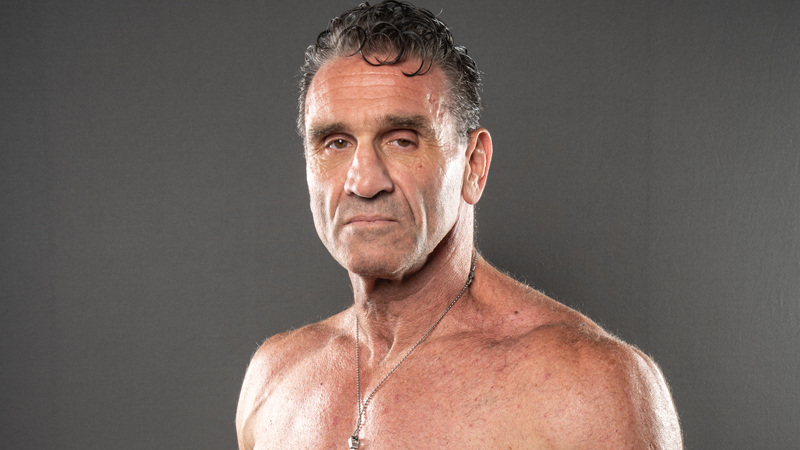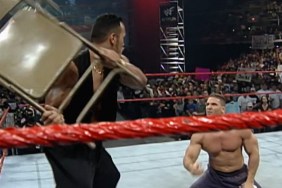Biographies on professional wrestlers and mixed martial artists can be very tricky undertakings due to individuals trying to make themselves look better or being less-than-honest in order to cover for someone else. Throw in a life filled with illegal drugs, illicit affairs and shady business deals, and it’s remarkable that Jonathan Snowden’s “Shamrock: The World’s Most Dangerous Man” paints as complete a picture as it does. It’s a fantastic look into the triumphs and failures of Ken Shamrock, who has led a full life as an MMA pioneer, pro wrestler and father.
Snowden does not shy away from anything. Shamrock opens up on being sexually abused as a child and becomes a truly sympathetic figure as he talks about feeling more at home on the streets than with his abusive stepfather. Even before he became a legend in Pancrase, Shamrock’s life always revolved around violence. After turning to a childhood filled with crime and watching as the foster system failed him repeatedly, Shamrock’s life changes for the better once foster parent Bob Shamrock takes him in. The bond between father and son isn’t romanticized in the book, as their many personal ups and downs are examined throughout and sets off a chain of events that lead to Shamrock’s becoming a professional wrestler.
After a brief yet fascinating look at the dying territorial wrestling system where Shamrock got his start, the book moves to Japan. There, Snowden details the start of Pancrase Hybrid Wrestling, one of the first (mostly) legitimate shoot-fighting organizations. These early chapters show the promotion’s idealistic founding on real competition, as Shamrock unexpectedly becomes its top fighter. The book also confirms the suspicions of many fans that several bouts were fixed to help Japanese competitors pad their records in front of native fans. Shamrock alleges that all three of his losses in the promotion weren’t legitimate and expresses much regret about losing to Minoru Suzuki, in particular. He also claims he carried Bas Rutten, unbeknownst to his opponent, in their first fight, allowing “El Guapo” to stick around for over 15 minutes before he submitted him.
Equally as fascinating was Shamrock’s career in the Ultimate Fighting Championship, as he was convinced it wasn’t an actual legitimate competition until fight day. While the Japanese scene was filled with outright corruption, Shamrock also discusses shady tactics used by the Gracies: not allowing him to wear his gear at the first event and adding a time limit to his rematch with Royce Gracie at the last minute. It truly was the Wild West back in the early 1990s, as no-holds-barred found its footing. Nothing shows how far the sport has come since than the many stories of how training at the Lion’s Den went down. Shamrock trained his ragtag crew of fighters with no protective equipment until Maurice Smith taught them traditional training methods; and there’s a hilarious story in which Shamrock purchased and used fencing helmets instead of actual headgear until the metal started to cave in and started cutting fighters. It also spotlights the darker moments, like when Shamrock would assault his own fighters in a drug-induced rage.
While “Shamrock: The World’s Most Dangerous Man” revolves around Shamrock’s life, it also tells the story of MMA’s progress. When the sport drifted into its dark days, Shamrock was forced to go back to pro wrestling in order to keep up with his drug- and sex-filled lifestyle. His stint in the World Wrestling Federation is filled with debauchery: Life on the road takes his toll, and Shamrock even becomes a drug dealer by selling ecstasy. Shamrock’s natural abilities and knowledge of submission holds helped him become a skilled wrestler, although he never reached his full potential in the WWF. He was often torn between wanting to go back to fighting and partying like a celebrity. Interview subjects don’t mince words throughout the book, and Shamrock’s drug issues are well-documented, as those around him flat-out call him an addict.
A few years after his WWF career comes to an end, Shamrock finds himself in the middle of the UFC’s popularity boom, as his feud with Tito Ortiz and appearance on “The Ultimate Fighter” help usher in a new era of MMA. However, his body can’t keep up due to all of the abuse and he begins to break down, especially after a war with Don Frye.
There are times when “Shamrock: The World’s Most Dangerous Man” becomes a downright depressing read. Shamrock’s personal life dissolves as he feuds with his ex-wife, the IRS and his adopted father. His children can’t remember any happy stories from their early childhood with their father, and he’s forced to continue to fight due his debts. All during his personal and professional struggles, Shamrock continues to be a draw for companies. After setting television records with the UFC, he becomes involved with failed upstarts in the International Fight League and EliteXC. Even after going on an embarrassing losing streak, his final fights for Bellator MMA against the aforementioned Gracie and Kevin “Kimbo Slice” Ferguson do viewership numbers the company can no longer replicate.
Most surprising of all is that there’s a happy ending of sorts. While no longer fighting, Shamrock is back in the ring professionally with Impact Wrestling and showing he still has it after all the wear and tear on his body. Shamrock is a man that has been to hell and back, and he has a better relationship with his family now than ever before.
“Shamrock: The World’s Most Dangerous Man” is an excellent account of history. Snowden has crafted the definitive look into one of the sport’s most prominent figures. No flaws are glossed over, and there are even more dark moments than bright, but Shamrock is portrayed as a true fighter throughout.
“Shamrock: The World’s Most Dangerous Man” is available now in paperback and digital formats on Amazon.
Recommended Reading:








